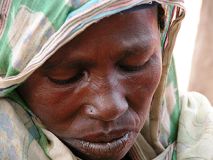Darfur insecurity hampering relief work – UN
June 19, 2006 (KHARTOUM) — Clashes among rebel groups and armed militias in the western Sudanese region of Darfur has severely limited humanitarian access to some 250,000 civilians affected by the conflict there, a senior United Nations official said on Monday.
 “We are trying to deal with it by negotiation with the parties involved,” Manuel Aranda da Silva, UN humanitarian coordinator and deputy special representative of the Secretary-General in Sudan, told reporters in Khartoum. “Most of the UN agencies and NGOs have been obliged to pull out from that region.”
“We are trying to deal with it by negotiation with the parties involved,” Manuel Aranda da Silva, UN humanitarian coordinator and deputy special representative of the Secretary-General in Sudan, told reporters in Khartoum. “Most of the UN agencies and NGOs have been obliged to pull out from that region.”
The UN had been unable to reach vulnerable people in West Darfur State due to the security problems, da Silva said. Since the signing of a 5 May peace agreement between the Sudan government and one faction of the rebel Sudan Liberation Army led by Minni Minnawi, the conflict had been characterised by small but violent clashes between Minnawi’s faction and another led by Abdelwahid Mohamed al-Nur.
Al-Nur, who refused to sign the agreement, has substantial popular support in the region, particularly among the Fur – the largest ethnic group. He has demanded better representation in the central government and more money than the US$30 million the Sudan government has earmarked for some three million people affected by the three-year conflict.
Da Silva observed that large-scale attacks on civilians by the Sudanese government have ceased since the signing of the agreement. “It is all quiet in Darfur in the last three weeks between the parties who signed the agreement,” he said.
Meanwhile, UN staff have expressed concern about an apparent aid blockade in the troubled eastern region. In recent days, aid workers had been refused access to the area, despite formal agreements with the Sudanese government allowing them to work in the region, da Silva said.
“Since the beginning of last week, we have been denied access to visit refugee camps,” he said. “This is a very strange development. If it is not solved very soon, we are going to have enormous problems in these refugee camps in the east.”
It was not immediately possible to get a comment from Sudanese government officials.
Rebels in Sudan’s east have complained that the impoverished region remains underdeveloped due to neglect by the central government. A similar grievance sparked the Darfur rebellion, in which rebels, complaining about political and economic marginalisation, attacked government positions in the region.
The Sudan government has been accused of arming Arab militias to crush the rebellion in Darfur, leading to a scorched-earth campaign of rape and murder – a charge it denies. The UN has called Darfur the world’s worst humanitarian crisis, while the United States has defined it as genocide.
(IRIN)
